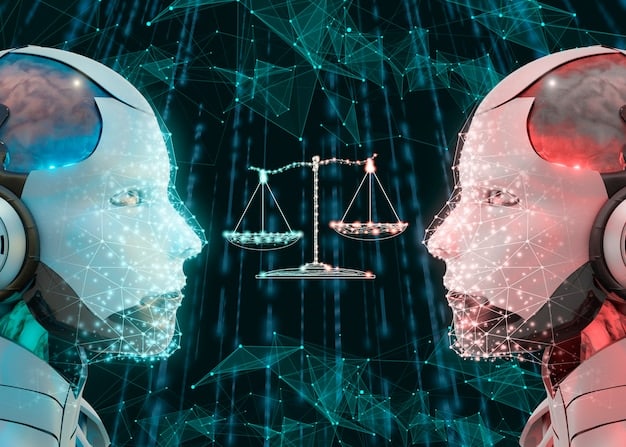AI Ethics: 6 Critical Questions for US Businesses Now

The Ethics of Artificial Intelligence: 6 Questions US Companies Should Be Asking Now addresses crucial ethical considerations businesses in the US must confront regarding AI implementation, focusing on transparency, bias, accountability, and societal impact.
The rapid evolution of artificial intelligence (AI) presents unprecedented opportunities for US companies, but also introduces complex ethical dilemmas. The Ethics of Artificial Intelligence: 6 Questions US Companies Should Be Asking Now aims to guide organizations in navigating these challenges responsibly.
The Urgency of AI Ethics in Corporate America
As AI becomes increasingly integrated into business operations, the need for a robust ethical framework becomes critical. This isn’t just about compliance; it’s about building trust, safeguarding reputation, and ensuring sustainable growth. US companies must proactively address the ethical implications of AI to avoid potential pitfalls.
Why AI Ethics Matters for Your Bottom Line
Ignoring AI ethics can lead to significant financial and reputational risks. From biased algorithms that discriminate against certain customer groups to a lack of transparency that erodes public trust, the consequences can be severe. Investing in AI ethics is not just a moral imperative but also a strategic advantage.
The Role of Leadership in Shaping AI Ethics
Ethical AI starts at the top. Leaders must champion a culture of responsible innovation, ensuring that ethical considerations are integrated into every stage of AI development and deployment. This requires clear policies, ongoing training, and a commitment to accountability.

Here are some key considerations for your organization:
- Establish a cross-functional ethics committee to oversee AI development and deployment.
- Develop clear guidelines for data privacy and security.
- Implement mechanisms for detecting and mitigating bias in AI algorithms.
- Prioritize transparency and explainability in AI systems.
Ultimately, embracing AI ethics is about building a sustainable and responsible future for your company and society as a whole. It’s about using AI to create value while upholding fundamental ethical principles.
Question 1: How Can We Ensure AI Transparency?
Transparency in AI is crucial for building trust and accountability. It means making AI systems understandable to stakeholders, including employees, customers, and regulators. This can be a challenge, especially with complex machine learning models, but it is essential for ethical AI deployment.
Defining AI Transparency
AI transparency involves providing clear information about how AI systems work, what data they use, and how they make decisions. This includes explaining the algorithms, the data sources, and the potential biases that may be present. Transparency allows stakeholders to understand and evaluate the impact of AI on their lives and businesses.
Practical Steps for Enhancing AI Transparency
There are several practical steps that US companies can take to enhance AI transparency. These include documenting AI systems, providing explanations for AI decisions, and making the underlying data and algorithms accessible for review.
Consider these strategies:
- Develop comprehensive documentation for all AI systems, including their purpose, data sources, and algorithms.
- Implement explainable AI (XAI) techniques to provide insights into how AI systems make decisions.
- Establish a process for auditing AI systems to ensure they are operating as intended and in accordance with ethical principles.
- Communicate transparently with stakeholders about the use of AI and its potential impact.
By prioritizing transparency, companies can build trust, mitigate risks, and ensure that AI is used responsibly and ethically.
Question 2: Are We Guarding Against AI Bias?
AI bias is a pervasive issue that can lead to unfair or discriminatory outcomes. Bias can creep into AI systems through biased data, biased algorithms, or biased assumptions. US companies must proactively address AI bias to ensure fairness and equity in their AI deployments.

Understanding the Sources of AI Bias
AI bias can arise from various sources, including historical data that reflects societal biases, biased algorithms that perpetuate existing inequalities, and biased assumptions that fail to account for diverse perspectives. It is crucial to understand these sources to effectively address AI bias.
Strategies for Mitigating AI Bias
Mitigating AI bias requires a multi-faceted approach that includes data audits, algorithm testing, and diversity in AI development teams. By taking these steps, companies can identify and address potential biases before they lead to harmful outcomes.
Key strategies include:
- Conducting thorough data audits to identify and correct biases in training data.
- Testing AI algorithms for bias using diverse datasets and performance metrics.
- Ensuring diversity in AI development teams to bring different perspectives and experiences to the table.
- Establishing a process for continuously monitoring and evaluating AI systems for bias.
By proactively addressing AI bias, companies can promote fairness, equity, and inclusivity in their AI systems and ensure that they are used for the benefit of all.
Question 3: What is Our AI Accountability Framework?
Accountability is a cornerstone of ethical AI. It means establishing clear lines of responsibility for AI decisions and ensuring that there are mechanisms in place to address harm caused by AI systems. US companies must develop a comprehensive AI accountability framework to ensure that AI is used responsibly and ethically.
Defining AI Accountability
AI accountability involves assigning responsibility for the design, development, deployment, and impact of AI systems. This includes establishing clear roles and responsibilities, implementing oversight mechanisms, and providing recourse for individuals or groups that are harmed by AI decisions.
Building a Robust AI Accountability Framework
Building a robust AI accountability framework requires a commitment from leadership, a clear understanding of potential risks, and a willingness to take corrective action when necessary. It also requires involving stakeholders in the process to ensure that their concerns are addressed.
A comprehensive framework should include:
- Establishing clear roles and responsibilities for AI design, development, and deployment.
- Implementing oversight mechanisms to monitor AI systems and ensure they are operating as intended.
- Providing channels for stakeholders to raise concerns and report harm caused by AI systems.
By establishing a clear AI accountability framework, companies can demonstrate their commitment to ethical AI and ensure that AI is used responsibly and for the benefit of society.
Question 4: How Does AI Impact Job Security and the Workforce?
The impact of AI on job security and the workforce is a significant ethical concern. As AI automates tasks and processes, there is a risk of job displacement and increased inequality. US companies must proactively address these concerns to ensure a just and equitable transition to an AI-driven economy.
Addressing Job Displacement
One of the main concerns surrounding AI is its potential to displace workers. As AI increasingly automates tasks previously done by humans, many fear widespread job losses. Companies need to address this by offering retraining programs and creating new opportunities for affected employees.
The Future of Work in an AI-Driven Economy
While AI may displace some jobs, it also has the potential to create new ones. As AI becomes more prevalent, there will be a growing demand for AI specialists, data scientists, and AI ethicists. Companies need to invest in education and training to prepare workers for these new roles.
Consider these measures:
- Investing in retraining programs to equip workers with the skills needed for AI-related jobs.
- Creating new job opportunities in areas such as AI development, data analysis, and AI ethics.
- Providing support and resources for workers who are displaced by AI.
By proactively addressing the impact of AI on job security and the workforce, companies can ensure a just and equitable transition to an AI-driven economy and promote shared prosperity.
Question 5: What Data Privacy Protections Are in Place?
Data privacy is a fundamental ethical consideration in the age of AI. AI systems rely heavily on data, and the collection, storage, and use of personal data must be done in a responsible and transparent manner. US companies must implement robust data privacy protections to safeguard the privacy of individuals and comply with relevant regulations.
Implementing Strong Data Privacy Policies
Strong data privacy policies are essential for building trust and protecting individuals’ rights. These policies should clearly define how data is collected, stored, used, and shared. They should also provide individuals with the right to access, correct, and delete their personal data.
Ensuring Compliance with Data Privacy Regulations
Compliance with data privacy regulations is not only a legal requirement but also an ethical imperative. US companies must comply with regulations such as the California Consumer Privacy Act (CCPA) and the General Data Protection Regulation (GDPR) to protect the privacy of individuals and avoid legal penalties.
To ensure data privacy:
- Implement strong data encryption and security measures to protect personal data from unauthorized access.
- Obtain informed consent from individuals before collecting and using their personal data.
- Provide individuals with the right to access, correct, and delete their personal data.
By implementing strong data privacy protections, companies can demonstrate their commitment to ethical AI and build trust with customers and stakeholders.
Question 6: How Does AI Impact Society and the Environment?
The societal and environmental impact of AI is a growing concern. AI has the potential to address some of the world’s most pressing challenges, but it also poses risks to democracy, social justice, and the environment. US companies must consider the broader societal and environmental implications of their AI deployments.
Considering Societal Impacts
AI can have a profound impact on society, for better or worse. It can be used to improve healthcare, education, and public services, but it can also be used to spread misinformation, manipulate opinions, and undermine democratic institutions. Companies need to be mindful of these potential impacts and take steps to mitigate them.
Promoting Sustainable AI Development
AI development also has an environmental impact. Training large AI models requires vast amounts of energy, contributing to greenhouse gas emissions. Companies need to adopt sustainable AI development practices, such as using energy-efficient hardware and optimizing algorithms for efficiency.
Consider these strategies:
- Investing in research to understand the societal and environmental impacts of AI.
- Engaging with stakeholders to identify and address potential risks.
- Promoting sustainable AI development practices to minimize environmental impact.
By considering the broader societal and environmental implications of AI, companies can ensure that it is used for the benefit of all and that its negative impacts are minimized.
| Key Point | Brief Description |
|---|---|
| 🔑 AI Transparency | Ensuring AI systems are understandable and explainable to all stakeholders. |
| ⚖️ Guarding Against Bias | Actively working to prevent and mitigate biases in AI algorithms and data. |
| 🛡️ Accountability Framework | Establishing clear responsibility for AI decisions and their impacts. |
| 💼 Workforce Impact | Addressing job displacement and creating new opportunities in the AI era. |
FAQ
▼
AI ethics is vital for US companies as it builds trust, ensures fairness, and avoids legal and reputational risks. It also promotes responsible innovation and aligns with societal values, fostering sustainability.
▼
Companies can ensure transparency by documenting AI systems, providing explanations for AI decisions, and making data and algorithms accessible for review. Transparent communication with stakeholders is also key.
▼
Mitigating AI bias involves conducting data audits, testing algorithms with diverse datasets, ensuring diversity in AI development teams, and continuously monitoring AI systems for bias.
▼
AI can lead to job displacement but also creates new roles. Companies can address this by offering retraining programs, creating AI-related jobs, and supporting workers affected by automation.
▼
Companies should implement strong data privacy policies, ensure compliance with regulations like CCPA and GDPR, use data encryption, and obtain informed consent for data collection.
Conclusion
Addressing the ethical implications of AI is not just a matter of compliance but a strategic imperative for US companies. By proactively addressing questions of transparency, bias, accountability, workforce impact, data privacy, and societal impact, organizations can harness the power of AI in a responsible and sustainable manner, fostering trust and ensuring long-term success.





